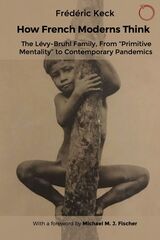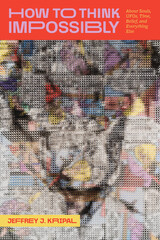4 books about Racial Identity
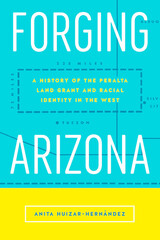
Forging Arizona
A History of the Peralta Land Grant and Racial Identity in the West
Anita Huizar-Hernández
Rutgers University Press, 2019
In Forging Arizona Anita Huizar-Hernández looks back at a bizarre nineteenth-century land grant scheme that tests the limits of how ideas about race, citizenship, and national expansion are forged. During the aftermath of the U.S.-Mexico War and the creation of the current border, a con artist named James Addison Reavis falsified archives around the world to pass his wife off as the heiress to an enormous Spanish land grant so that they could claim ownership of a substantial portion of the newly-acquired Southwestern territories. Drawing from a wide variety of sources including court records, newspapers, fiction, and film, Huizar-Hernández argues that the creation, collapse, and eventual forgetting of Reavis’s scam reveal the mechanisms by which narratives, real and imaginary, forge borders. An important addition to extant scholarship on the U.S Southwest border, Forging Arizona recovers a forgotten case that reminds readers that the borders that divide nations, identities, and even true from false are only as stable as the narratives that define them.
[more]
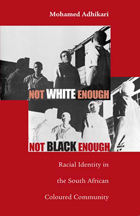
Not White Enough, Not Black Enough
Racial Identity in the South African Coloured Community
Mohamed Adhikari
Ohio University Press, 2005
The concept of Colouredness—being neither white nor black—has been pivotal to the brand of racial thinking particular to South African society. The nature of Coloured identity and its heritage of oppression has always been a matter of intense political and ideological contestation. Not White Enough, Not Black Enough: Racial Identity in the South African Coloured Community is the first systematic study of Coloured identity, its history, and its relevance to South African national life. Mohamed Adhikari engages with the debates and controversies thrown up by the identity’s troubled existence and challenges much of the conventional wisdom associated with it. A combination of wide-ranging thematic analyses and detailed case studies illustrates how Colouredness functioned as a social identity from the time of its emergence in the late nineteenth century through its adaptation to the postapartheid environment. Adhikari demonstrates how the interplay of marginality, racial hierarchy, assimilationist aspirations, negative racial stereotyping, class divisions, and ideological conflicts helped mold people’s sense of Colouredness over the past century. Knowledge of this history, and of the social and political dynamic that informed the articulation of a separate Coloured identity, is vital to an understanding of present-day complexities in South Africa.
[more]

Prince, Musical Genre, and the Construction of Racial Identity
Griffin Woodworth
University of Michigan Press, 2025
Throughout his career, the Minneapolis musician Prince was known for fusing different musical genres as well as moving between different identities—sexual lothario, devout man of God, androgynous sprite—qualities that fit the postmodernism of the 1980s. This volume takes a fresh look at Prince’s work, arguing that his music was deeply informed by the history and techniques of Black culture, and that his multigenre fluency and changeable image were weapons that he deployed in a career-long fight against the racially segregated structures of the American music industry. Using a methodology that mixes musicology with African American literary theory, queer theory, and gender studies, this book analyzes the ways that Prince mixed and manipulated musical genres that are indexed to racial identities—such as “White” rock or new-wave, and “Black” funk, gospel, or R&B—in order to construct pluralistic identities.
Each chapter includes detailed musical analyses and transcriptions of Prince’s songs, focusing on his use of rock guitar, new-wave synthesizers, funk drumming, gospel singing, and R&B horns. By tracking Prince’s transformations of instrumental and vocal idioms derived from specific musical genres, and considering the historical and cultural values embedded within those genres, Griffin Woodworth explores the ways that Prince musically broke down stereotypes of Black masculinity. With its intersectional approach to musical analysis, this book captures the sounds of American racial politics in the 1980s, 90s, and 2000s as heard through the music of one of the era’s most popular artists as he worked to transform and transcend those politics.
Each chapter includes detailed musical analyses and transcriptions of Prince’s songs, focusing on his use of rock guitar, new-wave synthesizers, funk drumming, gospel singing, and R&B horns. By tracking Prince’s transformations of instrumental and vocal idioms derived from specific musical genres, and considering the historical and cultural values embedded within those genres, Griffin Woodworth explores the ways that Prince musically broke down stereotypes of Black masculinity. With its intersectional approach to musical analysis, this book captures the sounds of American racial politics in the 1980s, 90s, and 2000s as heard through the music of one of the era’s most popular artists as he worked to transform and transcend those politics.
[more]
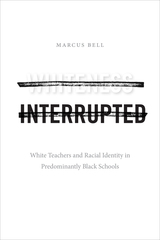
Whiteness Interrupted
White Teachers and Racial Identity in Predominantly Black Schools
Marcus Bell
Duke University Press, 2021
In Whiteness Interrupted Marcus Bell presents a revealing portrait of white teachers in majority-black schools in which he examines the limitations of understandings of how white racial identity is formed. Through in-depth interviews with dozens of white teachers from a racially segregated, urban school district in Upstate New York, Bell outlines how whiteness is constructed based on localized interactions and takes a different form in predominantly black spaces. He finds that in response to racial stress in a difficult teaching environment, white teachers conceptualized whiteness as a stigmatized category predicated on white victimization. When discussing race outside majority-black spaces, Bell's subjects characterized American society as postracial, in which race seldom affects outcomes. Conversely, in discussing their experiences within predominantly black spaces, they rejected the idea of white privilege, often angrily, and instead focused on what they saw as the racial privilege of blackness. Throughout, Bell underscores the significance of white victimization narratives in black spaces and their repercussions as the United States becomes a majority-minority society.
[more]
READERS
Browse our collection.
PUBLISHERS
See BiblioVault's publisher services.
STUDENT SERVICES
Files for college accessibility offices.
UChicago Accessibility Resources
home | accessibility | search | about | contact us
BiblioVault ® 2001 - 2024
The University of Chicago Press


